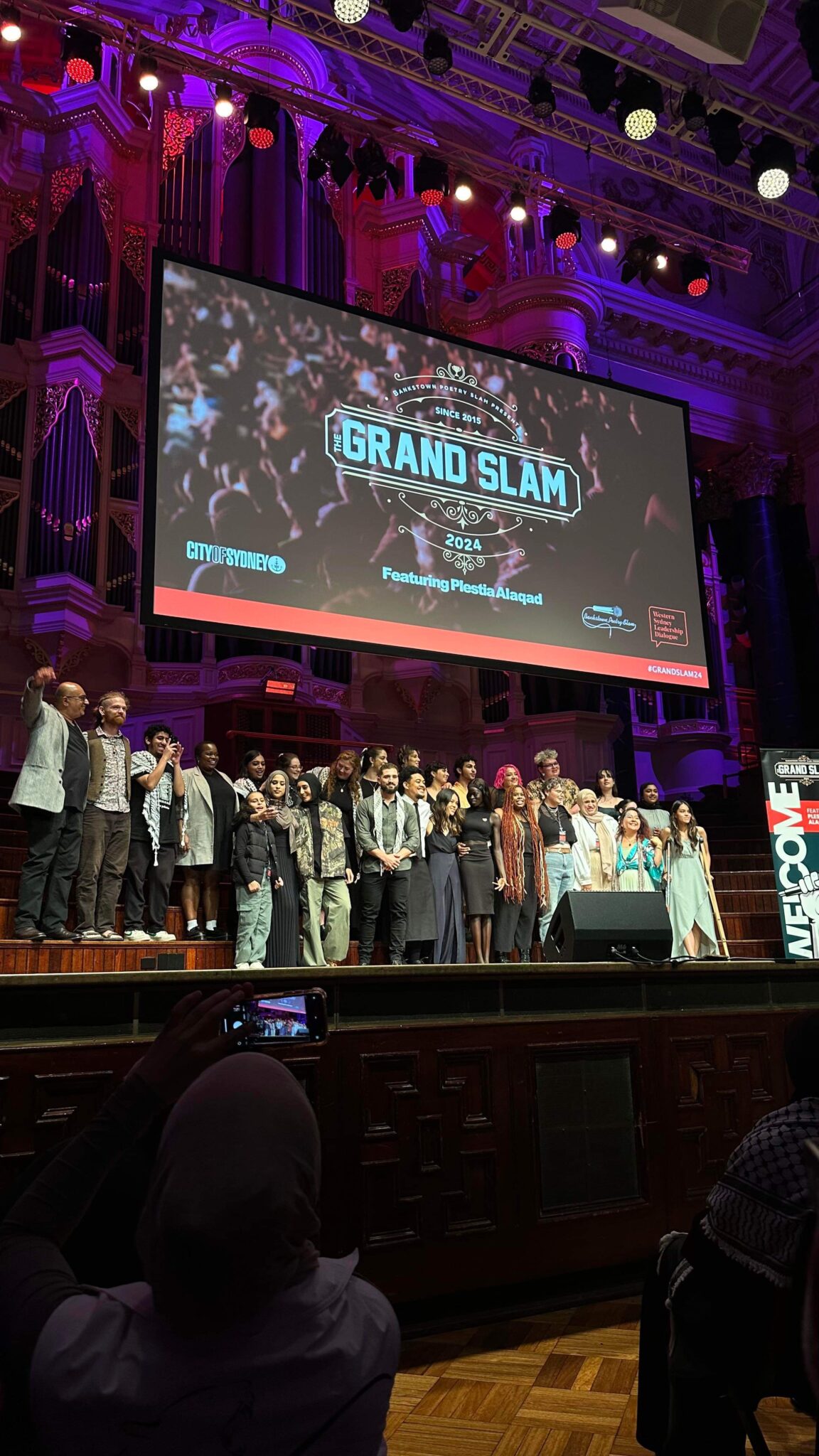Palestinian people are a living poem… we encapsulate beauty, tragedy and power. Initially, our war was a battle of language and words. Since we live in societies that promise freedom of expression, we tried to convey the suffering of our people ‘in a way they understand’, removed from slogans they deem anti-Semitic, and instead used the words that have always united us. For many of us the permission to narrate our own stories in our own words has been at the root of struggle and survival. In fact, it is necessary to delineate a physical space for our existence without any conditions.
Our resistance — in all its forms — has constantly been critiqued, sidelined and dismissed; from the flying of flags to the sharing of posts, to the protests and even, our poetry.
The grand finale of the Bankstown Poetry Slam took place on 12 February within the hallowed halls of Sydney Town Hall. This is one example of such resistance.Yet the event’s staging in Town Hall, an emblematic civic structure of Australia’s colonial history was incongruous. While events like this can attempt to reclaim such exclusionary spaces, history cannot be erased so easily. Many of the stained glass windows bear silent witness to this.
We experienced performances discussing duplicitous love, consent, intergenerational trauma, Princess Diana (every Arab mother’s idol), and the cost-of-living crisis in addition to the multiple poems indicating solidarity with Palestine. Only after a melange of applause, cheering and tears of catharsis, were we broken out of our collective trance, and instantly reminded of where we were, and what we had just heard.
It was particularly jarring to hear guest speaker Plestia Alaqad relaying her horrific experiences in Gaza, including that people are eating leaves to quell their starvation, whilst also being able to look at captain cook on board the very ship that wreaked havoc on these shores. This ‘beautiful’ window was parallel to a Statue of Liberty wannabe, adorned with the union jack and the southern cross; quite fittingly, she was adorned with horns.
Despite the colonial memory embedded within the space, the audience facilitated an environment of camaraderie and support, as they listened to the poets recounting the resilience and steadfastness of the Palestinian people.
The finalist poets took us on a journey while remaining seated inside Sydney Town Hall. We were all moved by A.R.A.B’s empowering message, urging us to check up on our male friends continually and giving the reminder that it takes only one conversation to keep these loved ones still with us. I found this a dutiful reminder, especially when the mental health of so many Palestinian and Arab men is being devalued and ignored. It also reminds us so strongly of the men who have been forgotten and been labelled so vehemently as ‘terrorists’ and ‘savages’.
One of my favourite pieces that night was delivered by audience favourite and winner of the night, HALAL COLLAB. They were masterfully able to intertwine humour, Palestine, The Area™, and the cost-of-living crisis we are all besieged under, demanding us to grapple with the question, “What is the cost of living in the world I am meant to grow up in?”. Having mulled this in my mind I still have no answer.
As the war escalates, so too does public discontent. Freedom of expression exists insofar as it does not challenge specific frameworks and narratives. When it concerns Palestine, hate seems to spout and spread, but it is love, ferocity and passion that have endured limitless. It is a continual testimony to those who’d want to see us fall that we are here to stay. While art may not change the world, it can hold the world accountable.
On my way out of those harrowed halls, it was impossible not to buzz in anticipation of what would come out of our movement. Plestia’s presence showed us how a poet’s soul releases the worth of words, for as they transform emotions, they transform reality. Time and time again, Palestinians have shown us the reality — exactly what we deal with and who we deal with, proving that we have only ourselves and people of conscience to effectuate our collective liberation. The Palestinian story has, is, and will continue to be alive for generations to come.





